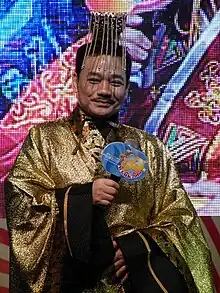Wong Yuk-long
Tony Wong Chun-loong[1] (born 27 March 1950), better known by his pseudonyms Wong Yuk-long or Tony Wong, is a Hong Kong manhua artist, publisher and actor, who wrote and created Little Rascals (later re-titled Oriental Heroes) and Weapons of the Gods. He also wrote adaptations of Louis Cha's novels, such as The Return of the Condor Heroes (retitled as Legendary Couples), Demi-Gods and Semi-Devils, and Ode to Gallantry. For his contribution and influencing a generation of artists in the local industry, he is regarded as the "Godfather of Hong Kong comics" or "Hong Kong's King of Comics".[2]
| Wong Yuk-long | |
|---|---|
 Wong at the Animation-Comic-Game Hong Kong in 2010 | |
| Born | Wong Chun-loong (黃振隆) 27 March 1950 Hong Kong |
| Nationality | Hong Konger |
| Area(s) | Writer, Artist, Publisher |
| Pseudonym(s) | Tony Wong |
Notable works | Oriental Heroes Weapons of the Gods |
| Wong Yuk-long | |||||||||||
|---|---|---|---|---|---|---|---|---|---|---|---|
| Traditional Chinese | 黃玉郎 | ||||||||||
| Simplified Chinese | 黄玉郎 | ||||||||||
| |||||||||||
| Wong Chun-loong | |||||||||||
| Traditional Chinese | 黃振隆 | ||||||||||
| Simplified Chinese | 黄振隆 | ||||||||||
| |||||||||||
He provided the art for Batman: Hong Kong, which was written by Doug Moench.[3] He has also acted in some films occasionally, including making a cameo appearance in Dragon Tiger Gate (a film adapted from Oriental Heroes).
History
He was born in Jiangmen in Guangdong. After he turned six, he moved to Hong Kong.[4]
He went to school until age 13, and after then started his artistic work. Wong never attended an educational institution focusing on art.[5] His decision to begin working at 13 was because he could command a relatively high salary at that time.[6]
In 1971, Wong created Jademan Holdings.[7] According to Monica Ko of the South China Morning Post, because of Wong's profile in the company, the company's stock became known as "personality stock". In 1989 he lost his position at Jademan by resigning, and so his involvement in the company's comics ended.[1] He attempted to take control of Jademan back. At some point he was convicted in Hong Kong courts of an offense.[8] He received a 2.5 year prison sentence. Wong went to Stanley Prison and was released after one year and six months. In 1993, the South China Morning Post wrote that "Despite his jailing, Mr Wong,[...] is still seen as a hero by young people in the territory."[9]
After Wong left prison, he established Jade Dynasty Publications.[10] His intention was to, in his words, "an oriental [sic] type of Walt Disney."[11]
In 2015 he had plans to have a theme park established in Hangzhou in Mainland China that would focus on comics.[4] The proposed park was to have a cost of $800,000,000 Hong Kong dollars.[12]
Selected works
- The Force of Buddha's Palm (如來神掌), based on Gu Long's Juedai Shuangjiao
- Dream of Ten Billion, 1994, autobiographical.[13]
- Demi-Gods and Semi-Devils (天龍八部), based on Louis Cha's novel of the same title.
- Dino Crisis (恐龍危機), based on the Capcom game of the same name.
- Drunken Fist (醉拳)
- Jackie Chan's Fantasia (奇幻龙宝)
- Legendary Couples (神鵰俠侶; "Companion of the Condor Hero"), based on Louis Cha's novel The Return of the Condor Heroes.
- Legend of Emperors (天子傳奇; "Emperor Legend"), featuring fictionalised stories of various Chinese kings and emperors.
- Mega Dragon and Tiger (龍虎5世; "Dragon and Tiger V")
- Oriental Heroes (龍虎門 Long Hu Men; "Dragon-Tiger-Gate"), originally titled Little Rascals (小流氓).
- Weapons of the Gods (神兵玄奇; "Mysterious Weapons of the Gods").
See also
References
- Ko, Monica (1990-01-15). "Following the departure of former chairman and chief artist To...". South China Morning Post – via Factiva.
artist Tony Wong Chun-loong, [...] Jademan (Holdings) [...] "comics king" Mr Wong, also known as Wong Yuk-long.[...]
- Hong Kong's King of Comics Giant Robot
- Batman: Hong Kong at DC
- Chow, Vivienne (2015-12-13). "'Little Rascals' head to Hangzhou: Hong Kong comic king plans a HK$800m theme park far from home". South China Morning Post. - The biographical data is in the form of an image, and is not text searchable.
- Wong, Yat-hei (2014-01-16). "'King' still packs a punch". South China Morning Post. Young Post. Retrieved 2023-06-08.
- Wong, Yat-hei (2013-10-05). "Comic book hero; Tony Wong is out to rescue HK's comic industry - again, writes Wong Yat-hei". South China Morning Post. p. 7.
- Thompson, Maggie; Frankenhoff, Brent, eds. (2010-09-27). Comics Shop. Iola, Wisconsin: Krause Publications. p. PT1709. ISBN 9781440216503.
- Lent, John A. (2015-01-05). Asian Comics. Univ. Press of Mississippi. p. PT131. ISBN 9781626742949.
- "Wong to use resources to build new empire". South China Morning Post. 1993-04-25. Retrieved 2023-06-08.
- "War breaks out in land of the comic king". South China Morning Post. 1993-04-25. Retrieved 2023-06-08.
- "My wish is to turn the company into an oriental type of Walt Disney". South China Morning Post. 1993-07-18. Retrieved 2023-06-08.
- Chow, Vivienne (2015-12-02). "'I'm a little disappointed that this cannot be built in Hong Kong': Comics 'godfather' Tony Wong Yuk-long to build HK$800 million theme park - in Hangzhou, Zhejiang". South China Morning Post.
- Wong, Wendy Siuyi (March 2002). Hong Kong Comics. Princeton Architectural Press. p. 177. ISBN 978-1-56898-269-4.
External links
- Wong Yuk-long at Lambiek's Comiclopedia
- Batman: Hong Kong review
- Giant Robot Interview
- Biographical information and discussion of his impact on video games